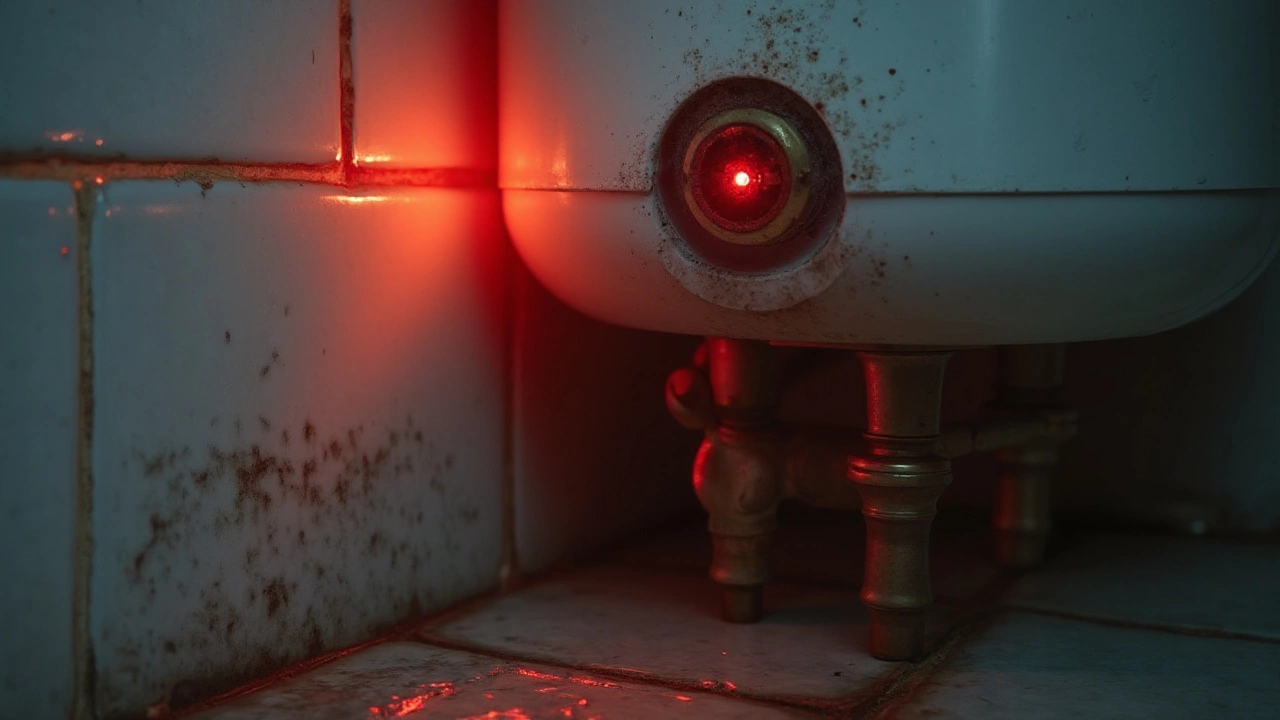Every homeowner relies on their water heater, often without giving it much thought. But when it starts acting up, it quickly grabs your attention, leaving you pondering what could possibly have gone wrong. It's crucial to recognize early warning signs to prevent bigger and more expensive problems down the road.
From unsettling noises to unexpected temperature changes, your water heater communicates in its own way, calling out for help. You might notice odd smells or even trails of water where they shouldn't be. These are all red flags, hinting that your water heater might be in distress.
Understanding these signs can save you time, money, and quite a bit of inconvenience. Let's dive into the world of water heaters and decode these signals to better manage and maintain this essential household appliance.
- Unusual Noises and Their Meanings
- Temperature and Water Quality Problems
- Smells and Leaks: Signs of Trouble
- Maintenance Tips for Early Detection
Unusual Noises and Their Meanings
Nothing can be quite as jarring as the unexpected sounds emanating from a water heater that quietly lurks in your basement or utility room. These noises can vary wildly in nature—from low-pitched hums to sharp popping sounds—each hinting at different potential issues. The key to managing these disturbances is understanding what they mean to address any underlying problems before they escalate. Anomalies when it comes to sounds often stem from sediment buildup at the bottom of the tank. Over time, natural minerals in the water supply settle, creating a layer that hardens under the intense heat of the elements. When this happens, you might notice popping or banging noises as the water tries to heat through the matted sediment.
Besides the well-known sediment-related popping, a humming noise could be a clue. This particularly resonates when there's a loose element inside the tank. As the water flows, it vibrates against this element, producing a peculiar humming sound. Tightening the element in place often solves the issue. The type of water heater also offers clues. Electric water heaters, for example, can sometimes produce strange sounds when air pockets are trapped around the heating element. When the pockets heat up, they expand, creating noise similar to a kettle on the boil. Electric water heater repair could address these noises efficiently, ensuring optimal operation.
A sizzle or hiss might arise when moisture comes into direct contact with a heated surface, potentially signaling a leak. Water escaping the system can land on hot components, resulting in a sizzling sound. Any leaks highlight the need for urgent repair to protect both the appliance and your home’s infrastructure. It's notable to mention what experts have to say. In an article by Home Energy magazine, they noted that "regular maintenance helps mitigate common water heater noises," indicating the importance of routine checks. Maintenance can help us tune into our water heater's needs before minor issues become major headaches.
The role of maintenance in ensuring the long life of water heaters brings us to addressing potential rumbling noises. This might particularly occur in natural gas water heaters when air becomes trapped in the tank. This phenomenon can cause low-frequency rumbling tones that, while not necessarily dangerous, would warrant attention to maintain peace and quiet in your home. While some sounds may initially sound ominous, with the right know-how and a timely response, addressing these subtle—and sometimes not so subtle—notes can lead to a long-lasting, efficient water heater experience.

Temperature and Water Quality Problems
The temperature of your water can speak volumes about the state of your water heater. If you notice that the water takes an eternity to heat up or loses heat faster than usual, it's worth looking into. Such issues often point to thermostat malfunctions or sediment build-up inside the tank, common culprits in reducing heater efficiency. Over time, sediment can act as an insulator, keeping the water away from the flame or heating elements that are supposed to warm it.
In some cases, the water coming out of your faucet might fluctuate rapidly between hot and cold. This can be not only frustrating but also a potential safety hazard. The primary cause could be mineral deposits compromising the heating elements or blocking the thermocoils. Hard water is notorious for leaving sediment behind, hence regular water heater maintenance becomes imperative to prevent these types of issues.
Quality of water is another aspect you can't afford to overlook. If the water has a rusty tint, your tank could be corroding from the inside. Corrosion weakens the tank structure, leading to leaks and, eventually, a full-blown breakdown. Test the water quality periodically to ensure everything is up to code. If you catch a smell reminiscent of rotten eggs, suspect a bacteria issue that is reacting with the magnesium anode rod used in most water heaters.
Being aware of your water temperature and quality can preempt major disruptions. As renowned home improvement expert Bob Vila notes,
“Prevention is the key. Taking care of small problems before they escalate is crucial to extending the lifespan of any home device.”Ensuring balanced pH levels can help ward off corrosion, while periodic flushing of the tank can combat sediment build-up.
For those wondering at what point these issues truly call for professional intervention, consider the severity and frequency of the problems. If these symptoms rear their heads occasionally, your heater might be manageable with DIY fixes and simple maintenance. But if they're persistent, it's wise to consult a specialist who can offer a deeper assessment of your home's plumbing system and water heater setup. Vigilance and routine checks are your best bet against sudden, inconvenient breakdowns.

Smells and Leaks: Signs of Trouble
Unexpected smells and leaks are not just nuisances but clear indicators that your water heater might be grappling with issues that need urgent attention. The first telltale sign is often a sulfur-like odor, which many describe as the smell of rotten eggs. This unsettling aroma typically indicates bacteria present in the tank, especially if it's been unused for a long time. Such bacteria react with sulfate in the water, producing hydrogen sulfide gas, hence the smell. Unfortunately, this isn't an issue you should tackle on your own unless you're familiar with water heater mechanics. Professional help can ensure a thorough cleaning and make sure everything’s operating safely.
Leaks are another significant red flag when it comes to water heater maintenance. Even the smallest puddle near your water heater could hint at a much larger problem beneath the surface. Water leaks may be due to a build-up of minerals causing corrosion inside the tank, leading to weakened metal that eventually gives way. In some cases, leaks could arise from faulty plumbing connections or valves that have become loose over time. Either way, ignoring these symptoms can escalate to major water damage inside your home, not to mention a potentially costly repair or replacement bill for the entire heater.
Moreover, if you stumble upon a leak, inspect it closely. If it appears to be coming from a pressure relief valve, it could mean that the valve is failing to operate correctly. A failing pressure relief valve is not something to take lightly, as it is crucial in preventing the tank from bursting in cases of excess pressure build-up. In case you find a leak, jot down some notes about when and where it occurs and inform a plumbing professional right away for an accurate diagnosis. According to experts, addressing these issues promptly can save you from more severe problems down the line.
In the realm of water heater repair, early detection and action are keys to prolonging the lifespan of your appliance. While unpleasant smells and unsightly leaks may be your water heater whispering for help, listening to these cues can save you from a sudden cold shower and an unexpected expense. Regular maintenance checks and keen observation are part and parcel of responsible home ownership, helping you steward your appliances to a longer service life.
"Prevention is key in avoiding high repair costs," notes the Homeowners Plumbing Association, emphasizing regular inspection to catch issues while they are small and manageable.

Maintenance Tips for Early Detection
Keeping your water heater in prime condition doesn't have to be a daunting task. Regular maintenance can head off potential problems at the pass, sparing you from cold showers and unexpected repair bills. It's about getting to know your water heater's behaviors and needs, akin to how you would with an old car or even a trusted appliance you've had for years. A crucial part of maintenance is the consistent observation and timely action, ensuring each component is working as it should.
Begin with a visual check every few months. Look for telltale signs around the heater, such as leaks or rust spots on the unit itself. Any visible corrosion on pipes or the tank could be an indication of moisture escaping where it shouldn’t. Consistently checking these can prevent minor issues from escalating into a full-blown flood hazard. It’s also wise to listen for any odd noises, such as popping or banging sounds signaling sediment build-up.
Temperature and water quality are your friends and allies in this maintenance journey. Consider investing in a water heater insulation jacket if your heater is a bit older; this can prevent heat loss and maximize efficiency. It’s a simple yet effective measure that cuts down the energy bill as well. Always check the temperature setting, ideally set around 120 degrees Fahrenheit to balance comfort and safety, minimizing the risk of scalding water incidents. This small act also allows the system to operate incredibly efficiently, reducing strain on its components.
“Regular maintenance is the cornerstone of a well-functioning water heater, as it is with most household appliances,” says John Bell, a seasoned plumber with over two decades of experience in the field.
Draining the tank once a year to remove built-up sediment is another tried-and-true tactic. Sediment buildup is notorious for reducing efficiency and causing overheating. Imagine trying to heat a kettle full of sand—it's not going to boil efficiently. Attach a garden hose to the drain valve and let the water and sediment run out—it's a reasonably easy task with an ample reward.
Lastly, don't ignore the anode rod. This simple metal rod inside your tank prevents rust by attracting the corrosive elements, effectively sacrificing itself over time. Check it every couple of years. If it looks more like a thin wire, replace it. This small piece of maintenance can extend the life of your water heater by several years.
Remember, proactive care for your water heater means fewer surprises later. Creating a habit of checking, listening, and cleaning might sound simple, but these actions indeed pay off. It's all about maintaining a balance of prevention, observation, and action.


